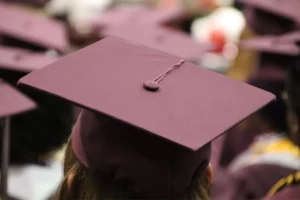Imagine you’re a working professional who never earned a college degree. You’ve gone far in your field, but every higher position requires a Bachelor’s.
Or perhaps you’ve been a college student for years, but never settled on a major. You have plenty of credits in plenty of subjects, but haven’t fulfilled the requirements for any one major to graduate.
Or you could be someone who has never earned a degree, but it’s always been a goal in the back of your mind. Now that the kids are in school, or you’re retired, or just have more time on your hands, you can finally think about achieving that dream.
The UW-Milwaukee College of Letters & Science can help.
This year, the College introduced the Bachelor of Arts in General Letters (BAGL). It allows students to earn a degree by exploring many areas rather than declaring and completing one major’s specific requirements.
“It’s open to anyone, but it’s really ideal for the type of student who doesn’t need a particular degree, but needs a bachelor’s degree,” said Matthew Knachel, a teaching professor in UWM’s Philosophy Department and one of the designers of the BAGL.
Knachel is speaking from experience. He is the recipient of a similar degree from the University of Dayton, where he started as a science major but bounced around as he explored other interests. With many credits from many subject areas but not enough for a true major, Knachel earned a general degree and used it as a stepping stone to graduate school.
The requisites
As with any degree, students working toward a BAGL must meet certain requirements in order to graduate. However, said Knachel, “since there’s no major, students can really take courses across the subjects that interest them.”
Students still need a total of 120 credits to graduate like any other UWM bachelor’s degree. At least 45 of those must be upper-level credits within the College of Letters & Science. They also must complete a portfolio that includes at least two “summative assessments” – a paper, exam, or project from an upper-level class, for example – and a reflection paper that asks students to analyze what they’ve learned and how it applies to their life outside of college. This takes the place of a traditional thesis or capstone project, Knachel said.
Just because students do not declare a major, however, does not mean they can’t specialize. Students can still earn a minor or interdisciplinary certificate (similar to a minor) in addition to their BAGL degree. Perhaps you’re that student who needs a Bachelor’s degree to get promoted at work. You might choose a minor that is helpful in your job.
Special Online Degree Pricing
Students can certainly complete the BAGL on UWM’s campus, but that might not be practical for some. Instead, those people can choose to complete their degree online.
Starting in the fall of 2024, Letters & Science will offer fully online students the option to declare themselves as fully online and receive special pricing of $395 per credit taken. This special pricing will be available for the BAGL as well as the other online bachelor’s degree programs in the College of Letters & Science.
This will be an attractive option for out-of-state students in particular. In-state students may find regular tuition pricing to be more cost effective depending on whether they attend full-time or part-time.
The new pricing is similar to the costs for other online bachelor degree programs across the nation.
“The need for a degree like the BAGL is high, and we had several students declare the program as soon as it became available. We’re so happy we can provide another option that will help increase the number of college graduates available to employers in the Greater Milwaukee area and beyond,” said Deanna Alba, Assistant Dean for College Relations in the College of Letters & Science.
By Sarah Vickery, College of Letters & Science
